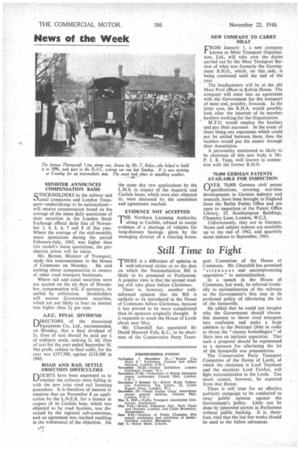Still Time to Fight
Page 24

If you've noticed an error in this article please click here to report it so we can fix it.
rrERE is a difference of opinion in well-informed circles as to the date on which the Nationalization Bill is likely to be presented to Parliament. A popular view is that the second reading will take place before Christmas.
There is, however, another wellinformed opinion that the Bill is unlikely to be introduced in the House of Commons before Christmas, because it has proved to be more complicated than its sponsors originally thought. It is expected to reach the House of Lords about next May.
Mr. Churchill has appointed Sir David Maxwell Fyfe, K.C., to be chairman of the Conservative Party Tram port Committee of the House of Commons. Mr. Churchill has promised "strenuous and uncompromising opposition" to nationalization.
In a speech in the House of Commons, last week, he referred ironically to nationalization of the railways as the Government's first step in its professed policy of alleviating the lot of the housewife.
He added that he could not imagine why the Government should choose this moment to throw road transport into confusion and make a large addition to the National Debt in order to thrust the "clumsy butterfingers" of State into an intricate apparatus. That such a proposal should be represented as a measure for alleviating the lot of the housewife was preposterous, The Conservative Party Transport Committee of the House of Lords, of which the chairman is Lord Teynharn and the secretary Lord Fairfax, will fight nationalization in the Lords. Too much cannot, however, be expected from that House.
There is still time for an effective publicity campaign to be conducted to sway public .opinion against the Government's policy. Little can be done by interested parties in Parliament without public backing. It is, therefore, vital that the last few weeks should be used to the fullest advantage.




































































